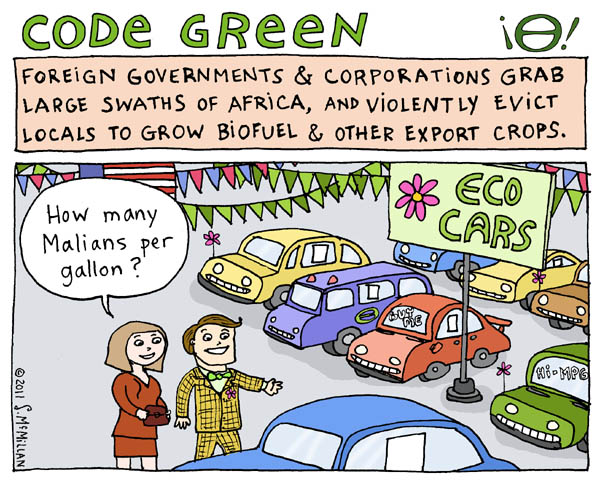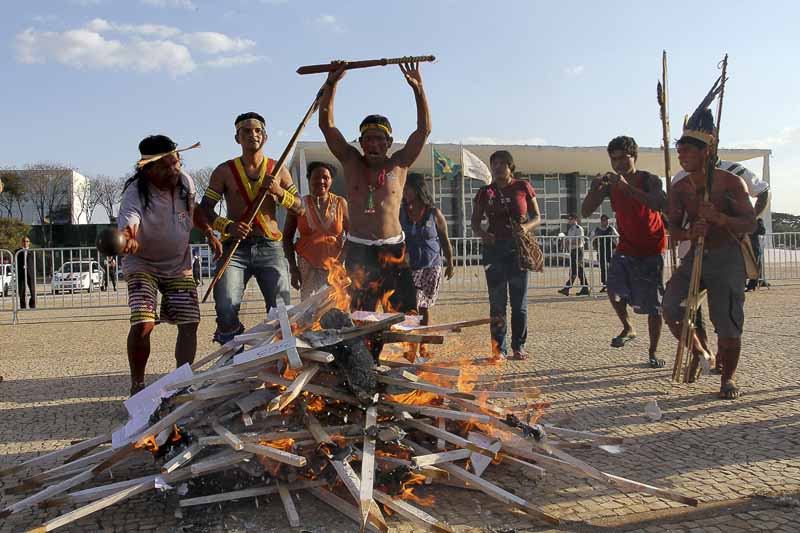
by Deep Green Resistance News Service | Oct 12, 2012 | Climate Change
By Inderscience Publishers
Biofuels will serve the interests of large industrial groups rather than helping to cut carbon emissions and ward off climate change, according to research to be published in the International Journal of Environment and Health this month.
Simone Vieri of the University “La Sapienza” of Rome, Italy, explains that, in its policies to combat climate change, the European Union has planned to increase to 10% the share of fuel derived from biofuels on the market by 2020. It has focused attention on first-generation biofuels, made from the conversion of plant material which can be grown specifically for fuel production, such as corn, soy, sugarcane or palm oil. It has given only a secondary role to second-generation biofuels, made from agricultural and woody crop biomass, including waste and by-products.
Vieri suggests that, “In 2020 the EU won’t be able to keep to its 10% biofuels goal using only European agricultural production, but will have to continue importing the greatest part of raw materials, or biofuels.”
In this frame, Vieri explains that, “The EU’s decision to focus on the first-generation biofuels, raises many doubts.” In particular, the approach seems to favour several issues. For instance, it favours production systems that are in competition with traditional agriculture for use of resources and production factors, he says. Additionally, to encourage agro-industrials models, such as those on which the production of first generation biofuels is based, might compromise the possibility of developing models based on multifunctional agriculture and, then, on the production of energy from agriculture waste and by-products rather than from dedicated products.
The adoption of first-generation biofuels sometimes leads to exploitation of human and environmental resources of poorer countries, adds Vieri, as they are commonly the source of many of the agricultural raw materials used for production of biofuels. Moreover, agricultural production processes that change land use can lead to zero net benefit in terms of emissions reduction.
Other problems that arise when reliance is placed on first-generation biofuels lie with the economics. Financial market speculation strengthens the link between the price of oil and the price of the main agricultural raw materials, Vieri says. Furthermore, an increase, or instability of agricultural products’ prices, weighs heavily on poorer nations and their food security.
In this context “the choice to promote first generation biofuels is an example of how politics places the protection of the interests and profit strategies of a restricted number of subjects before the costs and benefits to be had on a wider scale,” adds Vieri.
Vieri adds that the “green economy” model might break new ground if it were to prove able to facilitate reduced emissions and allow economic growth and development with direct benefit to society itself rather than the profits of multinationals.

by Deep Green Resistance News Service | Oct 10, 2012 | Lobbying, Toxification
By Jeff Gray / The Globe and Mail
Chevron Corp. has lost a bid to have the U.S. Supreme Court consider its call for a worldwide ban on attempts to collect on a controversial $19-billion (U.S.) environmental judgment levelled against the company in Ecuador.
The decision comes with lawyers in Canada poised to battle in a Toronto courtroom next month over an attempt by the Ecuadorean plaintiffs to seize Chevron’s considerable Canadian assets to cover at least part of the massive judgment – a judgment the oil giant dismisses as fraudulent.
In the latest twist in a tangled legal saga, Chevron was trying to revive a preliminary injunction issued last year by a federal judge in New York. That injunction was later overturned on appeal. It purported to block the plaintiffs and their lawyers from trying to enforce the 2011 Ecuadorean court ruling not just in the U.S., but anywhere outside of Ecuador.
The U.S. Supreme Court refused on Tuesday to hear the case. It issued no reasons, as is customary, leaving the appeal court decision that quashed the injunction in place.
The news comes as lawyers for the plaintiffs – a group of villagers in the Amazon rainforest – have stepped up their campaign to force the oil company to pay for environmental damage from oil pollution in the Lago Agrio area of Ecudaor.
Chevron, based in San Ramon, Calif., has said it has virtually no assets remaining in Ecuador, and the plaintiffs have vowed to chase the company’s assets elsewhere. Their first stop, earlier this year, was Canada.
In May, they announced they had retained prominent Toronto lawyer Alan Lenczner, of Lenczner Slaght Royce Smith Griffin LLP, to try to have the judgment recognized by the Ontario Superior Court and force Chevron to fork over its Canadian assets, which include oil sands holdings. The plaintiffs have also filed a similar collection effort in Brazil.
In sprawling litigation in the United States, both sides have accused each of fraud and bribery in connection with the Ecuadorean ruling, allegations they both deny.
Chevron said Tuesday in an e-mailed statement that the company was disappointed with the decision but “will continue to defend against the plaintiffs’ lawyers’ attempts to enforce the fraudulent Ecuadorean judgment, and to further expose their misconduct in our pending [litigation] in New York and other proceedings.”
The plaintiffs’ say the ruling is the latest in a series of defeats for Chevron in U.S. courts.
“Chevron’s latest loss before the Supreme Court is an example of the company’s increasingly futile battle to avoid paying its legal obligations in Ecuador,” Aaron Marr Page, a lawyer for the Ecuadoreans, was quoted as saying in an e-mailed statement.
Read more from The Globe and Mail: http://www.theglobeandmail.com/report-on-business/industry-news/the-law-page/chevron-loses-bid-to-have-ecuador-case-heard-by-us-supreme-court/article4599707/

by Deep Green Resistance News Service | Oct 9, 2012 | Biodiversity & Habitat Destruction, Colonialism & Conquest, Indigenous Autonomy, Obstruction & Occupation
By Jeremy Hance / Mongabay
Construction on Brazil’s megadam, Belo Monte, has been halted again as around 150 demonstrators, most of them from nearby indigenous tribes, have occupied the main construction site at Pimental. Over a hundred indigenous people joined local fishermen who had been protesting the dam for 24 days straight. Indigenous people and local fishermen say the dam will devastate the Xingu River, upending their way of life.
“The renewed occupation of the project’s earthen cofferdams paralyzed construction works, while indigenous protestors seized the keys of trucks and tractors forcing workers to leave the strategic Pimental work camp on foot,” reads a press release from the NGO Amazon Watch. Around 900 workers were sent home.
This is the second occupation attempt in less than six months. Over the summer some 300 indigenous people sustained an occupation of the dam for 21 days, before breaking it off though little headway was made in talks with consortium building the dam, Norte Energia.
The Belo Monte dam, which would be the world’s third largest, has been plagued by controversy from its origin decades ago; the battle for the dam has been fought both in Brazil’s courts and on the international stage. If built, the dam will flood an estimated 40,000 hectares of present rainforest and could push some fish species to extinction. In addition, 16,000 people will be displaced according to the government, though some NGOs say the number is more likely double that.
Despite the impacts, the dam has been strongly supported by Brazilian President Dilma Rousseff, and every legal injunction against the dam has been overturned. Norte Energia has filed with a local court for repossession of the construction sties.
Indigenous groups say the construction of the dam is already imperiling their way of life, as the Xingu river becomes more difficult to navigate. They have also said they have no intention of leaving until Norte Energia meets their demands.
“We are witnessing the devastation of this land. The island of Pimental was completely destroyed, with a sole tree left standing, and the water is putrid. It is very shocking,” an protestor told Amazon Watch.
Dams are often described as ‘green’ energy source, however in the tropics they actually release significant methane emissions due to rotting vegetation. Although it has a shorter life than carbon, methane is a far more potent greenhouse gas.
From Mongabay: “Indigenous groups re-occupy Belo Monte dam in the Amazon“
by Deep Green Resistance News Service | Oct 9, 2012 | Climate Change
By Phys.org
Richard York, a researcher with the Department of Sociology and Environmental Studies Program at the University of Oregon, has found that a measured reduction in CO2 emissions during economic downturns is not on par with the increase in CO2 emissions that is apparent during boon times.
York made this discovery after analyzing the Gross Domestic Product (GDP) of several nations during the period 1960 to 2008, and then comparing these values with the countries’ corresponding annual measures of CO2 emissions. The results are published in the journal Nature Climate Change.
Conventional thinking held that greenhouse gas emissions will tumble at the same rate as they rise depending on economic conditions. York wasn’t convinced: accordingly, he decided to study the ups and downs of the economies of 150 of the world’s major countries over the course of nearly a half century.
He then compared each country’s GDP and carbon emission measures over time. What he found was that, on average, CO2 emissions rose by 0.73 percent for every 1 percent rise in GDP during economically prosperous times, but fell just 0.43 percent for every 1 percent fall in GDP during economically depressed periods , indicating that greenhouse gasses fall at roughly half the rate that they rise.
York has a theory regarding this observed phenomenon— CO2 emission levels are partly based on a country’s economic and infrastructure history. If a country builds factories, cars and roads during strong economic times, this infrastructure and machinery will still be there when the economy experiences a dip. And, while the new assets may be used less during difficult times, there is very little chance they won’t be used at all. Therefore, carbon emissions, while somewhat decreased, will never return to their pre-development levels.
York’s findings are likely to dampen one of the few bright spots surrounding the economic malaise currently impacting many countries, particularly Europe. The hope—that slow economic growth was decreasing the amount of CO2 being added to the atmosphere, thereby minimizing global warming, and as some have suggested, weather volatility—may be little more than wishful thinking. York concludes by suggesting that, based on his results, governments worldwide will likely need to rethink their predictions regarding CO2 emissions.
This might be particularly true for those countries that set their goals based on assumptions made at the 2009 Copenhagen summit, which focused on nations working together to combat the problems of greenhouse gas emissions and global warming, and which was organized around conventional theories of CO2 emissions in developed and developing nations.
From Phys.org: http://phys.org/news/2012-10-environmentalist-co2-faster-good-falls.html#jCp

by Deep Green Resistance News Service | Oct 6, 2012 | Colonialism & Conquest, Indigenous Autonomy, Mining & Drilling, Obstruction & Occupation
By Survival International
A protest involving Earth’s most threatened tribe, the Awá, has forced the world’s largest iron ore mine to suspend operations along its main railway line.
On Tuesday, hundreds of Indians including the Awá, took to the tracks of Vale’s Carajás railway to voice their opposition to Brazilian government plans that could weaken their land rights, if legalized.
The demonstration follows months of anger surrounding a draft text called Directive 303, which prohibits the expansion of indigenous territories.
The government has refused to scrap the proposed directive, despite it violating national and international laws by suggesting certain projects can be carried out on Indian land without proper consultation.
Frustrations spilled over on Tuesday, with several different tribes uniting to demand that their land rights are respected.
The blockade is the latest in a string of controversies to involve mining giant Vale, whose railway borders the territory of the Awá.
Last month, a judge reversed a ruling that had stopped the company from doubling its railway line to increase production.
The decision was a blow for the Awá, who blame the railway for bringing thousands of invaders into their lands and scaring off the animals they hunt.
Survival’s Director Stephen Corry said today, ‘If Brazil wants to lead the way and show the world that it respects its indigenous peoples, it should not be entertaining the harmful propositions of a handful of rural lobbyists. This protest shows that for tribes like the Awá, land rights are make or break.’
From Survival International: http://www.survivalinternational.org/news/8722




